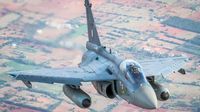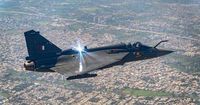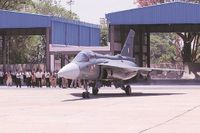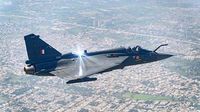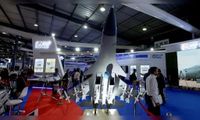New Delhi: After nearly two years of delay, GE Aerospace has announced the delivery of the first of 99 F404-IN20 engines to Hindustan Aeronautics Limited (HAL) for the Tejas Light Combat Aircraft Mk-1A. The company, without alluding to the furore caused in India due to the delayed engine deliveries, noted in a press statement that restarting the engine’s production was a challenge. This much-awaited engine comes after over two years of delays, which have directly affected the delivery of Tejas Mk-1A fighter jets to the Indian Air Force (IAF).
According to a contract signed between HAL and GE in August 2021, the American firm is supposed to deliver 99 engines to cater to the IAF’s order for 83 LCA Mk-1A aircraft inked earlier that year. The delay led to concerns within the IAF, which is eager to operationalize its new aircraft amid dwindling squadron strength. Currently, the IAF is at 31 squadrons compared to a sanctioned strength of 42.
GE Aerospace had collaborated with India’s Aeronautical Development Agency (ADA) in the 1980s. In 2004, its F404-IN20 engine was selected for the single-engine Tejas. “Our F404 engine family, one of the most successful in military aviation history, powers thousands of combat aircraft worldwide. The F404-IN20 engine is a tailored design for India’s single-engine fighter with the highest thrust within (the) F404 family and a higher-flow fan, unique single-crystal turbine blades, and numerous special components,” GE Aerospace stated.
The company added that GE Aerospace and Tejas teams had collaborated closely for several years to customize the engine for the needs of the IAF. “The F404 demonstrated it was an excellent fit for the Tejas LCA. On its first test flight in 2008, the aircraft climbed to numerous mission altitudes and achieved Mach 1.1 speed,” the statement noted.
By 2016, GE had fulfilled its commitment to HAL and delivered 65 F404-IN20 engines for the Tejas LCA. However, the production line had to be started from scratch to make additional engines, as with no follow-on engine orders on the horizon, the F404-IN20 production line was shut down. “However, when HAL ordered an additional 99 engines in 2021 for the Tejas Mk-1A LCA, our team began the complex task of restarting the F404-IN20 production line, which had been dormant for five years, and re-engaging the engine’s global supply chain,” the company stated.
Restarting the jet engine’s production line was a challenging process, especially during the Covid pandemic. “With a high focus on safety and quality and a remarkable commitment from our supply chain teams and our suppliers and partners, we have managed to restart the line,” GE Aerospace said. The company’s lean operating model, known as ‘FLIGHT DECK’, helped alleviate bottlenecks and identify solutions to improve manufacturing processes and turnaround time.
This week’s first engine delivery was described by GE as a “testament to what we have accomplished with HAL over the past 40 years” and a symbol of “our combined potential to ensure a strong future for India’s military.” The Tejas Mk1As are intended to replace the ageing MiG-21 fleet, enhancing India’s combat readiness. In addition to the F404 engines, HAL is also collaborating with GE Aerospace on the GE-414 engine, which will be used to power the LCA Mk-II variant.
In the financial markets, the delivery of the first F404-IN20 engines to HAL is expected to allay investors' execution risk concerns and provide revenue visibility, analysts reported. On the bourses, HAL's share price advanced 2% on the BSE, rising to ₹4,209 per share in intraday trading following the announcement. The engine has been handed over to HAL's Freight Forwarder in the US, which is expected to be received at HAL premises within a week's time.
HAL received an order for 83 Tejas Mk-1A (Light Combat Aircraft) in FY21, with delivery expected to start in FY24. However, the non-availability of the engines impacted the company's delivery timeline, in turn affecting its revenue booking. The delivery of the first F404-IN20 engine thus irons out supply chain issues for HAL. Analysts believe HAL's manufacturing revenue should see material improvement from FY26 onwards, with the infrastructure in place for supplying 16 Tejas Mk-1A aircraft annually, scalable to 24 aircraft per year.
ICICI Securities has upgraded HAL stock to 'Buy' with a share price target of ₹5,000, suggesting a potential 21.12% return for shareholders over the next year. GE Aerospace is required to deliver two engines per month to HAL as per the contract, and consistent supply of the same can lead to the IAF placing an incremental order for 97 Tejas Mk-1A aircraft.
HAL is helping the IAF scale up its fighter aircraft inventory to a targeted 42 squadrons, which currently stands at 32 squadrons. At the end of the previous financial year (FY24), HAL's order book stood at around ₹94,000 crore, providing revenue visibility of 3.2x its FY24 revenue. The order book was bolstered by orders for 12 Su-30 MKI aircraft worth ₹13,500 crore and ₹26,000 crore for 240 aero engines of the Su-30 MKI aircraft, leading to a calculated order backlog of ₹1.35 trillion.
Looking ahead, HAL's order pipeline remains robust with expected orders for additional Tejas Mk-1A (97), ALH (25), LUH (12), and RD-33 engines (80) in the near to medium term. The brokerage maintains a 'Buy' rating on the stock, with a target price of ₹4,887 per share, valuing it on a price-to-earnings (PE) multiple of 40x FY27E earnings.
In summary, the successful delivery of the F404-IN20 engines marks a significant milestone for HAL and the Indian Air Force, as it aims to enhance its operational capabilities and address the pressing need for modernized fighter aircraft amidst rising regional security challenges.

